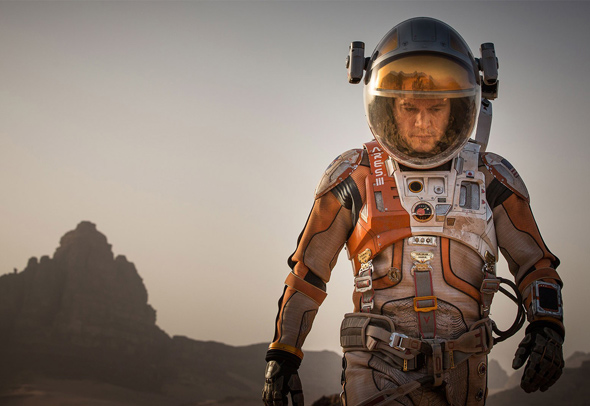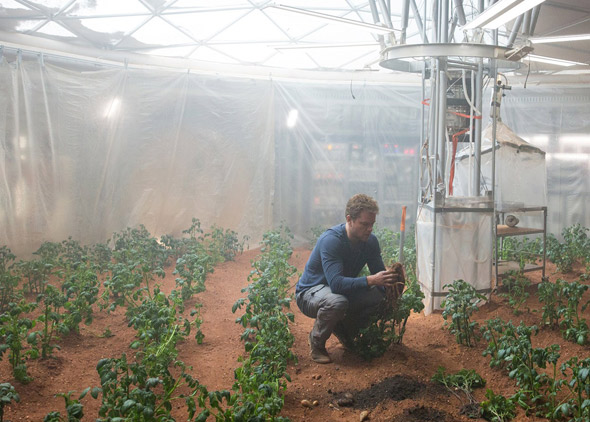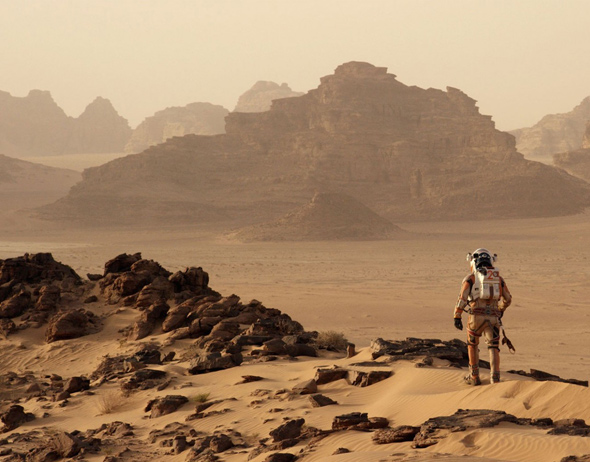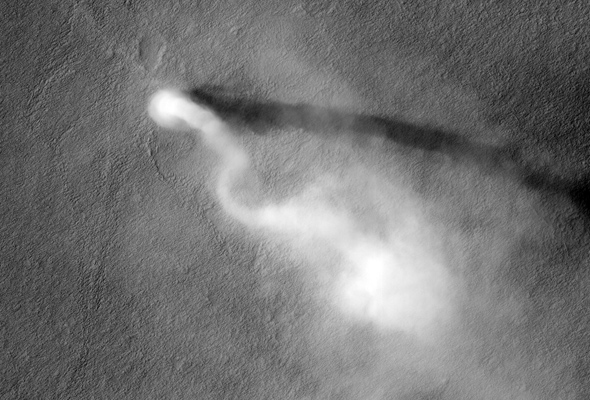My Favorite Martian

Courtesy of 20th Century Fox
What would it be like to walk across the surface of Mars?
Go watch The Martian, and find out. During a lot of the movie, it really felt like I was watching events unfold on the Red Planet. The scenery and photography were just that real.
Seriously, the movie would be worth the price of admission just for that (though, full disclosure: I’m a space dork). But also? It’s just a really fun movie.
I know, a lot of you are expecting me to light into the science of the movie, but I won’t bother; it’s been covered extensively (like on io9 and Vox; also NASA has a nice summary of real tech they’re working on to keep people alive on Mars).
But as I’ve said over and again, good or bad science won’t make or break a movie for me. I’m more interested in story, and if science is an important part, I’m more concerned with how it’s depicted over what’s actually shown. In The Martian, science is depicted really well for the most part, and what’s better, the people doing the science are shown actually doing it.
Spoilers from here on out, so if you want to keep your knowledge of the movie pristine, then just go see it, then come back and continue reading, OK?
The basic premise of the movie is that early on in the exploration of Mars, a team of astronauts is doing their work when a big storm rises. They have to evacuate in a hurry and wind up leaving their botanist, Mark Watney,* behind, thinking he had died. He then has to figure out how to live on Mars for more than a year with extremely limited resources and no help from Earth. His only hope? Science.

Courtesy of 20th Century Fox
There are no aliens in this flick, no faster than light travel, no sci-fi gimmicks. It’s all based on real tech, real extrapolation, and even if some Hollywood shortcuts are taken, they don’t change the basic level of reality to the movie.
In fact, I’d say science is every bit the protagonist of this movie that Watney is. We see it through his eyes, from the perspective of someone who not only does it for a living, but really, sincerely loves doing it.
When Watney is thinking things through, talking out loud for his video diary, actually doing the work, you can see that the science of it is his lifeblood. It’s keeping him alive, of course, but his relationship is much deeper than that. As it must be; certainly science keeps astronauts alive on Mars, but going to Mars is something they chose to do, to dedicate their lives for, and the reason they made that decision in the first place is at least in part due to their love of science.
This is said out loud for the audience after yet another setback, when Watney ponders the idea that there’s a good chance he won’t make it back. He leaves a message for his parents, telling them that what he was doing was bigger than just one person and also that he really loved his job.
And I like the fact that he’s a smartass about it too, as shown in this clip of a deleted scene from the movie:
Look, if given the chance, I’d touch the ChemCam too.
I know a lot of scientists like Watney. And I’ll note that this same attitude comes through in all the characters; it took everyone to come together, to work as a team to save Watney. And here’s something I’m not sure many people noticed: There are no bad guys in the movie. The closest we get to that is the NASA director, and even then he’s only making decisions he thinks need to be made. There are no incompetent people, no fools doing something foolish at just the worst moment (example: see any zombie movie ever made) just to move the plot forward. Here, the plot is driven by necessity, and that necessity is “Keep Watney alive against a Universe that doesn’t care whether he’s alive or dead.”
So yeah, I’m very happy with how science was depicted in the movie.
I also really liked the story. I read the book, which is quite good, though very technical and firmly in the category of hard sci-fi. The movie eases up on that somewhat, though it doesn’t flinch from giving details where needed. There’s no way not to make the comparison to the movie Apollo 13, which had a similar premise. What makes both movies gripping is that the stories are well told; we care about the people involved, and that there are failures along the way that need to be overcome.
There were many times I choked up a bit in the movie, mostly when it was showing things I knew to be true: The grueling hard work real people at NASA would in real life put in to save someone, the dedication of the crew, Watney’s can-do attitude.
Also, when he finds Pathfinder (a very real and very important NASA mission to Mars) by following the shroud lines of the parachute, well, that was very, very cool.
Again, I’m a space dork, but my wife, who is not (she’s space dork adjacent), really enjoyed it too. So there’s your calibration mark if you need it.

Courtesy of 20th Century Fox
And again, I want to stress just how gorgeous this movie is. I saw it in 3-D, which was done quite well. There was one scene in particular when Watney is driving the rover over the Martian surface, and we see him from far above. There are towering, wind-eroded spires of sedimentary rock surrounding the sand-swept valley he’s in, and watching that I had a strong sense of déjà vu: This is exactly what we see from spectacular images taken by orbiting Mars space probes. These are usually shots taken straight down, with vertical perspective squashed, but in the movie we move past them, seeing them for the lofty structures they truly are, and in that moment I felt like I really was moving across the landscape of an alien world.
It was a transformative moment. Ridley Scott directed the movie, so I expect nothing less. He delivers.
Also, in many scenes you can see dust devils whipping around in the background. These are common on Mars, and including them was a magnificent touch.
But the best scene? The very best one? It’s literally the very last shot, in the astronaut training classroom, after Watney gives a speech about space exploration, its dangers and triumphs. When he asks, “Any questions?” and immediately every hand shot into the air.
Oh my. Yes, that’s NASA.
Bottom line: If you’re a space fan, then yeah, see this movie. But then, you probably already have. If not, then go see it anyway. It’s a fun story, crafted well. And if you walk away with a sense of, “Hey, science is pretty cool!” then you know what? We’re good here.
*I’d say this is the best sci-fi movie I’ve ever seen that has Jessica Chastain helping to find astronaut Matt Damon who is lost on another world. Any other movie with that premise would be ridiculous.


